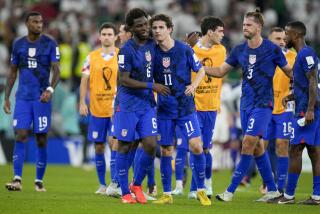SOCCER / JULIE CART : Wegerle Is Facing an Uphill Battle
- Share via
It’s difficult not to feel bad for Roy Wegerle, except that he’s not the sort who would allow it. Wegerle, one of the U.S. soccer team’s most experienced players, has been brought to his knees by the ligaments and cartilage in them. He had surgery on his right knee last Friday for the third time since January.
Wegerle has not played for his club, Coventry City in the English Premier League, since being hurt in a game Jan. 8 and having surgery on his right knee 10 days later. Recovery did not go well. After experiencing persistent swelling and pain, he had another operation last month.
The pain came back again and Wegerle stayed in England to rehabilitate his knee. But when it became clear that he would not be able to play for Coventry again this season, the club gave him permission to rejoin the U.S. team in Mission Viejo. Wegerle flew into L.A. last Thursday night and took a taxi directly from the airport to the team’s doctor, Bert Mandelbaum.
An MRI test disclosed a tear of the lateral meniscus cartilage and Wegerle had more surgery Friday.
Knee problems are never good news for a player or his team, but a third operation only eight weeks before the first game of the World Cup tournament is a blow. Wegerle plays as a withdrawn forward in Coach Bora Milutinovic’s single-striker attack. It’s a critical position for the U.S. team, one that involves both helping to set up goals and scoring them.
Wegerle’s immediate goals, however, are to strengthen his knee and play with the team again. He said he expects to be running in about two weeks. He had been considered certain to be a starter. Now he has to consider himself in competition for the job.
“It’s impossible to forget what’s at stake and what I have to do,” Wegerle said from his hotel room in Mission Viejo. “It’s certainly very hard. Having said that, I’m not going to go overboard with my rehab. I’ve got to do what I have to do. The staff will give me as much time as I a need. They’ll give me every opportunity.”
The U.S. coaches don’t have much choice but to hope Wegerle heals. Said General Manager Bill Nuttall: “If he’s a great healer, no problem. If he’s not, there’s a question mark in June.”
Until then, Wegerle is waiting for the team to return to the training center later this week so he can get reacquainted.
“The boys have been training together for more than a year,” he said. “There is no substitute for that. For the six or seven of us based in Europe, we are missing out. I want to get back around the team. I want to talk to them and see what they feel. I have to get in and among them. This is like a family and we need to talk.”
*
When do normal security precautions generate abnormal responses? When the World Cup Organizing Committee’s security department sends out security waivers to about 5,000 international media representatives and others seeking accreditation for this summer’s tournament.
The waiver would normally have been included in credential applications, but was inadvertently left out. When the memos were sent out recently, howls of protest arose from news organizations that called the waivers an invasion of privacy. Many are refusing to sign the forms.
The waiver gives the FBI, state and local law-enforcement agencies authorization to release “criminal history and criminal investigative records” of applicants to the WCOC.
Olympic organizing officials routinely run criminal checks on journalists applying for credentials. What they don’t routinely do is draw attention to the practice.
Officials at FIFA responded with chagrin.
“We consider it unfortunate because of the way it was handled,” a spokesman said. “However, for overall security and safety, it seems we have to live with it.”
Everyone recognizes the need for adequate security. But what’s accomplished by screening journalists, players and coaches? What is the perceived threat?
Realistically, what are the odds that a terrorist will have a press pass? What if a journalist does has a criminal record, does that mean he or she poses a threat? Does that mean that a person without a record doesn’t?
*
It seems as if the soccer calender in Germany is shrinking.
First a game against England was canceled because it was to have been played on Adolf Hitler’s birthday, April 20, and the English feared neo-Nazi demonstrations.
As a consolation, the German Football Assn. awarded Berlin a game against Wales next year, one of Germany’s qualifying matches for the 1996 European Championship. However, that match won’t come off because it is scheduled for the birthday of another Nazi, Rudolf Hess.
The mass-circulation publication Bild noted that yet another game, Nov. 15 against Bulgaria, is to be played on the birthday of Field Marshal Erwin Rommel. For future scheduling purposes, Bild published the dates of the potentially offending birthdays of Joseph Goebbels, Hermann Goering and Heinrich Himmler.
More to Read
Go beyond the scoreboard
Get the latest on L.A.'s teams in the daily Sports Report newsletter.
You may occasionally receive promotional content from the Los Angeles Times.







